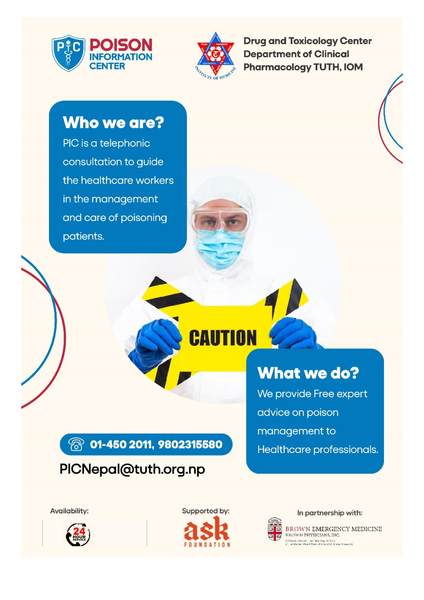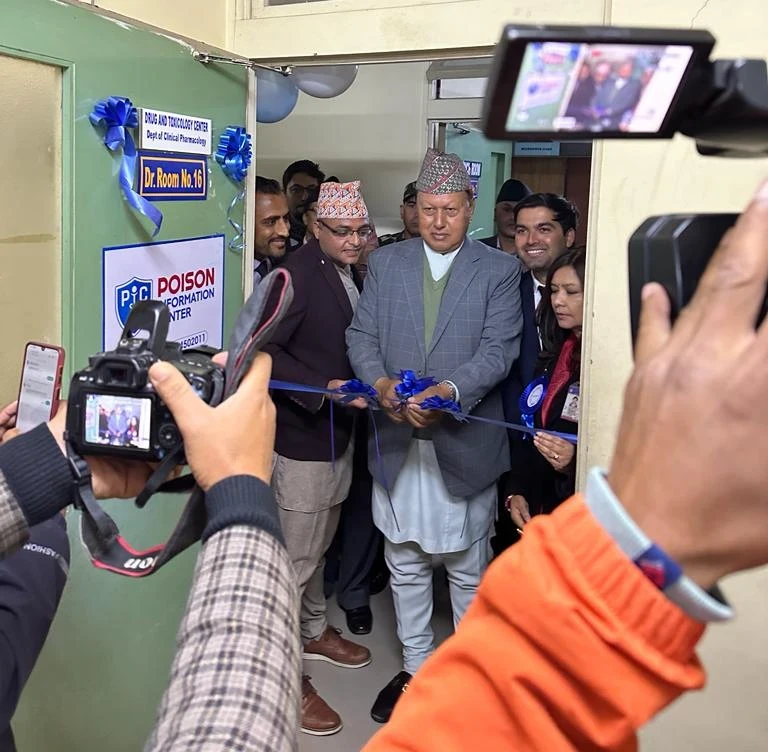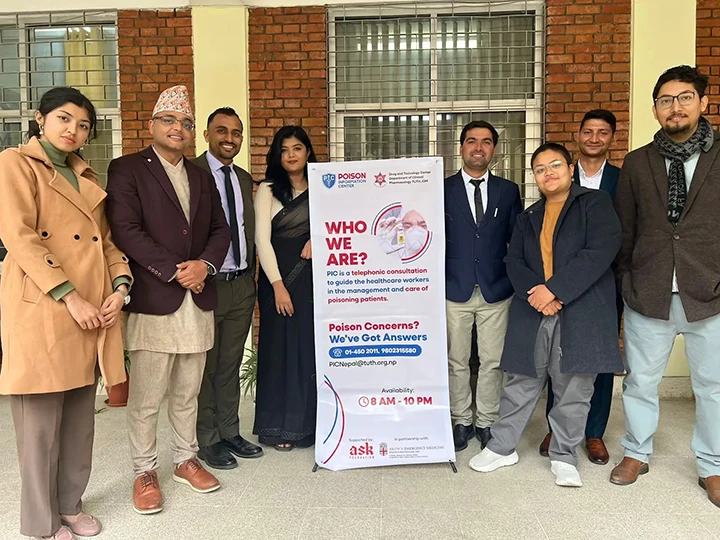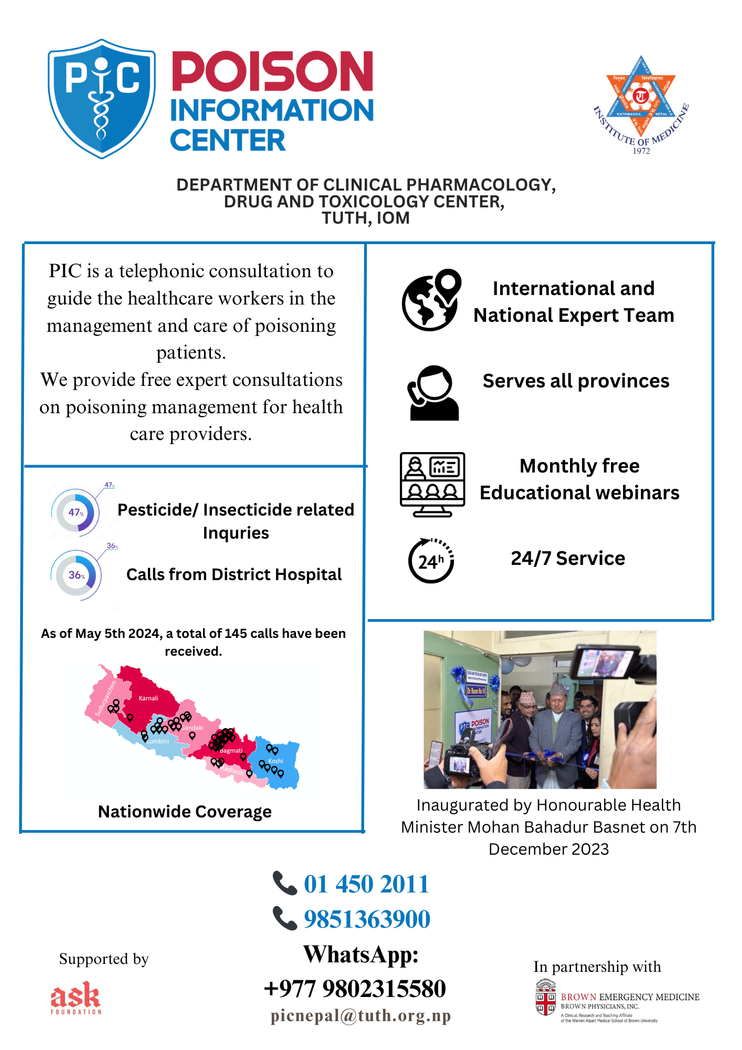Poison Information Center (PIC)
Poison Information Center (PIC) serves as a telephonic consultation service aimed at guiding healthcare workers in managing and caring for poisoning cases.
Ask Foundation is currently supporting Nepal’s first Institution based Poison Information Center (PIC) as logistic partner which aims to increase access to poison care of Nepali patients presenting with poisonings, envenomation, and after chemical exposures to health care facilities. Poison Information Center (PIC) serves as a telephonic consultation service aimed at guiding healthcare workers in managing and caring for poisoning cases.
The center is operating in collaboration with Brown University as key international academic partner and Department of Clinical Pharmacology, Tribhuvan University Teaching Hospital as an implementing partner and ASK Foundation as a logistic partner. PIC was inaugurated by then honourable health minister Mohan Bahadur Basnet on December 7, 2023. Within the six months since its inauguration, PIC has received 187 calls from all over the provinces of Nepal. A robust support system involving 12 national and 14 international experts has been established to provide backup support to the SPIs, ensuring comprehensive guidance for complex cases. Additionally, it also conducts monthly webinars with international expert speakers on various important topics. Some of these webinars had participants reaching more than 200.
Office Location-TUTH, Maharajgunj
Hotline 01 4502011 for teleconsultation (experts available 24 hours)
- International and National Expert Team
- Serves all provinces
- Monthly free Educational Webinars
- 24/7 Service
Call PIC
Instagram: @pic_nepal
Whatsapp/Viber: +977 985-1363900
Email: [email protected]
Why it is important?
According to the 2019 Nepal Burden of Disease study, injuries accounted for 7.8% of all deaths. In 2019, 1.8% of all deaths were caused by self-harm, which included the intake of analgesics, antipyretics, antirheumatics, gasses, fumes, hanging, strangulation, and suffocation. Recognizing the need for a national poison center, the Nepalese government identified the establishment of a national poison center strategy as one of its top goals for strengthening Nepal’s emergency treatment. With a national government mandate, a clear need for nationalized and standard resources in toxicological emergencies, and demonstrated health and economic benefits, Nepal’s first institutional PIC (Nepal PIC) was established in Nepal’s largest government teaching hospital.

Call Distribution of PIC across Nepal
.webp)
View Gallery



Scientific Article
.png)
Monthly open-access educational and capacity building webinars
These webinars feature national and international experts discussing various aspects of poison management.
| Date of Webinar | Topics | Speakers | Participants | YouTube Link |
|---|---|---|---|---|
| 29th August 2024 | Metabolic Acidosis & Organophosphorus Poisoning: Clinical Management | Dr. Knut Erik Hovda and Dr. Olita Shilpakar | 150 | Link |
| 1st August 2024 | Mushroom Poisoning: Clinical Manifestation, Management, and Identification | Dr. Joshua Bloom and Dr. Shiva Devkota | 180 | Link |
| 27th June 2024 | Snake Identification and Management | Dr. Ramu Kharel, Brown University; Dr. Krishna Prashad Acharya, Nepal | 240 | Link |
| 29th May 2024 | Caustic Ingestions and Plant Poisoning in Nepal and its Management | Dr. Jim Whitledge, Medical Toxicologist, UVM; Dr. Pravin Prashad, Tribhuvan University Teaching Hospital | 74 | Link |
| 30th March 2024 | Aluminum Phosphide Poisoning and Snake Bite in Nepal | Prof. Dr. Ashish Bhalla, India, Medical Toxicologist; Dr. Krishna Prasad Acharya, Snake Bite Expert, Nepal | 90 | Link |
| 22nd February 2024 | Heavy Metal Toxicity | Dr. Joshua Bloom, Brown University; Dr. Ayushma Pandit, SPIs, PIC | 80 | Link |
| 11th January 2024 | Paraquat Poisoning Case Discussion | Dr. Rishika Karki- SPIs | NA (internal) | Link |
| 5th December 2023 (Hybrid: Online and In Person) | Paracetamol poisoning and overview of pesticide management | Dr. Samara Sogoian, Medical Toxicologist, NY poison centre; Dr. Ramu Kharel, Brown University | 50 | - |
| 28th December 2023 | Aluminum Phosphide, Zinc Phosphide Poisoning | Dr. Rajesh Sharma- Lead SPIs | NA (internal) | Link |
| 8th November 2023 | Overview of Poisoning, and insights from Nepal’s first Institutional Poison Information Center | Dr. Ramu Kharel, Brown University; Dr. Jonathan D. De Olano, Medical Toxicologist, Emory; Dr. Rakesh Ghimire, Tribhuvan University Teaching Hospital | 40 | Link |